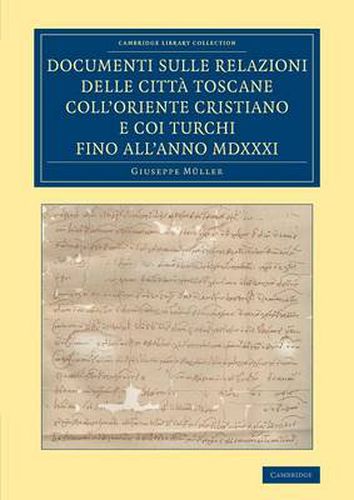Readings Newsletter
Become a Readings Member to make your shopping experience even easier.
Sign in or sign up for free!
You’re not far away from qualifying for FREE standard shipping within Australia
You’ve qualified for FREE standard shipping within Australia
The cart is loading…






Born in Moravia, the philologist and historian Joseph (Giuseppe) Muller (1825-95) translated into Italian several major works of German classical scholarship. He held positions at the universities of Pavia and Padua, in the state archives of Florence, and finally in Turin. This work, published in Florence in 1879, prints original documents from the archives of the Tuscan city states in Latin, occasionally Greek, and later in Italian, ranging from the twelfth to the sixteenth century. The first half comprises correspondence with the crusader kings, the Christian communities of the Near East, and subsequently the Ottoman sultanate, introducing ambassadors and negotiating privileges for the city states’ communities and representatives in the region. The second half contains the deliberations of the maritime republics on sailing routes and trade schedules. Together they illuminate political and practical relations between the Orthodox, Catholic and Muslim worlds surrounding the Mediterranean in this formative period.
$9.00 standard shipping within Australia
FREE standard shipping within Australia for orders over $100.00
Express & International shipping calculated at checkout
Born in Moravia, the philologist and historian Joseph (Giuseppe) Muller (1825-95) translated into Italian several major works of German classical scholarship. He held positions at the universities of Pavia and Padua, in the state archives of Florence, and finally in Turin. This work, published in Florence in 1879, prints original documents from the archives of the Tuscan city states in Latin, occasionally Greek, and later in Italian, ranging from the twelfth to the sixteenth century. The first half comprises correspondence with the crusader kings, the Christian communities of the Near East, and subsequently the Ottoman sultanate, introducing ambassadors and negotiating privileges for the city states’ communities and representatives in the region. The second half contains the deliberations of the maritime republics on sailing routes and trade schedules. Together they illuminate political and practical relations between the Orthodox, Catholic and Muslim worlds surrounding the Mediterranean in this formative period.